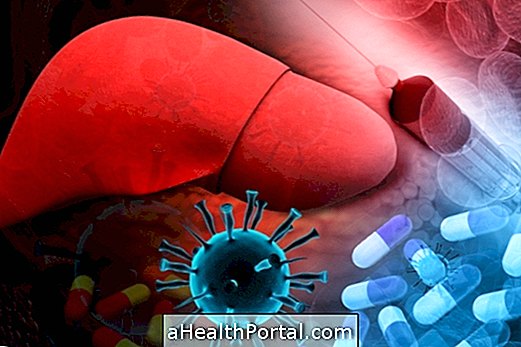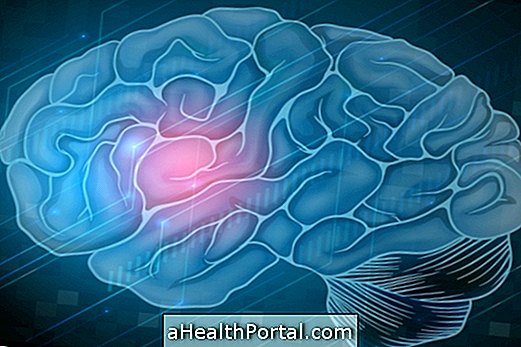Acute hepatitis is all inflammation of the liver that lasts up to 6 months, being resolved during this time period. There are several causes for hepatitis, and the main ones include virus infections, drug use, alcoholism or immunity diseases, for example.
Despite the various causes, the symptoms presented in acute hepatitis are usually similar, and include malaise, headache, fatigue, lack of appetite, nausea, vomiting, yellow skin and eyes. Generally, this inflammation progresses benign and healing after a few weeks or months, however, some cases can become serious and even cause death risk.
Therefore, it is always necessary that in the presence of symptoms that indicate hepatitis, the person undergoes the evaluation of the doctor, who will confirm the suspicion by the clinical evaluation and request for tests, such as dosage of liver enzymes (ALT and AST) and abdominal ultrasound, for example. The treatment then includes rest, hydration and use of remedies in specific cases, according to the cause when indicated by the doctor.

Main symptoms
Although they may vary slightly, depending on the cause, the main symptoms of hepatitis are:
- Tiredness or fatigue;
- Loss of appetite;
- Fever;
- Joint and muscle pains;
- Malaise;
- Headaches;
- Nausea;
- Vomiting.
After a few days of the onset of complaints, in some cases there may be a yellowing of the skin called jaundice accompanied by itching of the skin, dark urine and whitish feces. Subsequently, it is common to follow a recovery period, with a decrease in signs and symptoms, often evolving to cure the disease.
In some cases, the inflammatory process of hepatitis lasts for more than 6 months, turning into chronic hepatitis, which usually does not occur in type A or E viral hepatitis, but is common in type B and C hepatitis, and may also occur in others, such as drugs, alcoholic or autoimmune, for example. Learn more about chronic hepatitis.
When it can be serious
Although not the most common, any acute hepatitis can become serious, especially when it is not detected early and when treatment is not started properly. If hepatitis becomes severe, it can seriously compromise the functioning of the liver and biliary tract, which increases the risk of bleeding, interferes with the production of proteins or the functioning of the immune system and can affect the functioning of other organs of the body.
In addition, during the acute phase of hepatitis, there may be acute liver failure, which should be made early because rapid therapeutic interventions such as liver transplantation may be required.
When it can become fulminant
Acute fulminant hepatitis is also known as acute liver failure, and arises only in rare cases of hepatitis that evolve very intensely and detract from the whole metabolism of the body. It is one of the most serious diseases of the liver, and can kill about 50% of its patients.
The initial symptoms of fulminant hepatitis are the same as those of common hepatitis, with the presence of dark urine, yellow eyes, sleep disturbances, inaccurate speech, and slow reasoning, with the risk of complications such as swelling in the brain and multiple failure of organs. These serious complications can even lead to death, and it is very important to seek medical help whenever symptoms appear that indicate this disease. Learn more about the causes and treatment for fulminant hepatitis.

What are the causes
Among the main causes of acute hepatitis are:
- Infection with the hepatitis A, B, C, D, or E virus. Know the forms of transmission and how to prevent viral hepatitis;
- Other infections, such as cytomegalovirus, parvovirus, herpes, yellow fever;
- Use of medications such as certain antibiotics, antidepressants, statins or anticonvulsants, for example. Learn more about what can cause hepatitis medicines;
- Autoimmune diseases, in which the body produces antibodies inappropriately against itself;
- Changes in the metabolism of copper and iron;
- Circulatory changes;
- Acute biliary obstruction;
- Aggravation of chronic hepatitis;
- Disorders of fat metabolism;
- Cancer;
- Toxic agents such as drugs, contact with chemicals or consumption of certain teas, for example.
In addition, there is the so-called transinfectious hepatitis, which is caused by infections that do not occur directly in the liver, but accompanies severe generalized infections, such as septicemia.
How to confirm
To confirm acute hepatitis, in addition to analyzing the clinical picture and symptoms presented by the person, the doctor may request tests capable of detecting lesions in the liver tissue or changes in the functioning of the liver and biliary tract, such as alanine aminosgransferase (ALT, formerly known as TGP ), aspartate aminotransferase (AST, formerly known as TGO), GT range, alkaline phosphatase, bilirubin, albumin and coagulogram.
In addition, imaging may be required to look at the appearance of the organ, such as ultrasound or CT scan, and if the diagnosis is not clear, a liver biopsy may even be required. Learn more about liver exams.




















